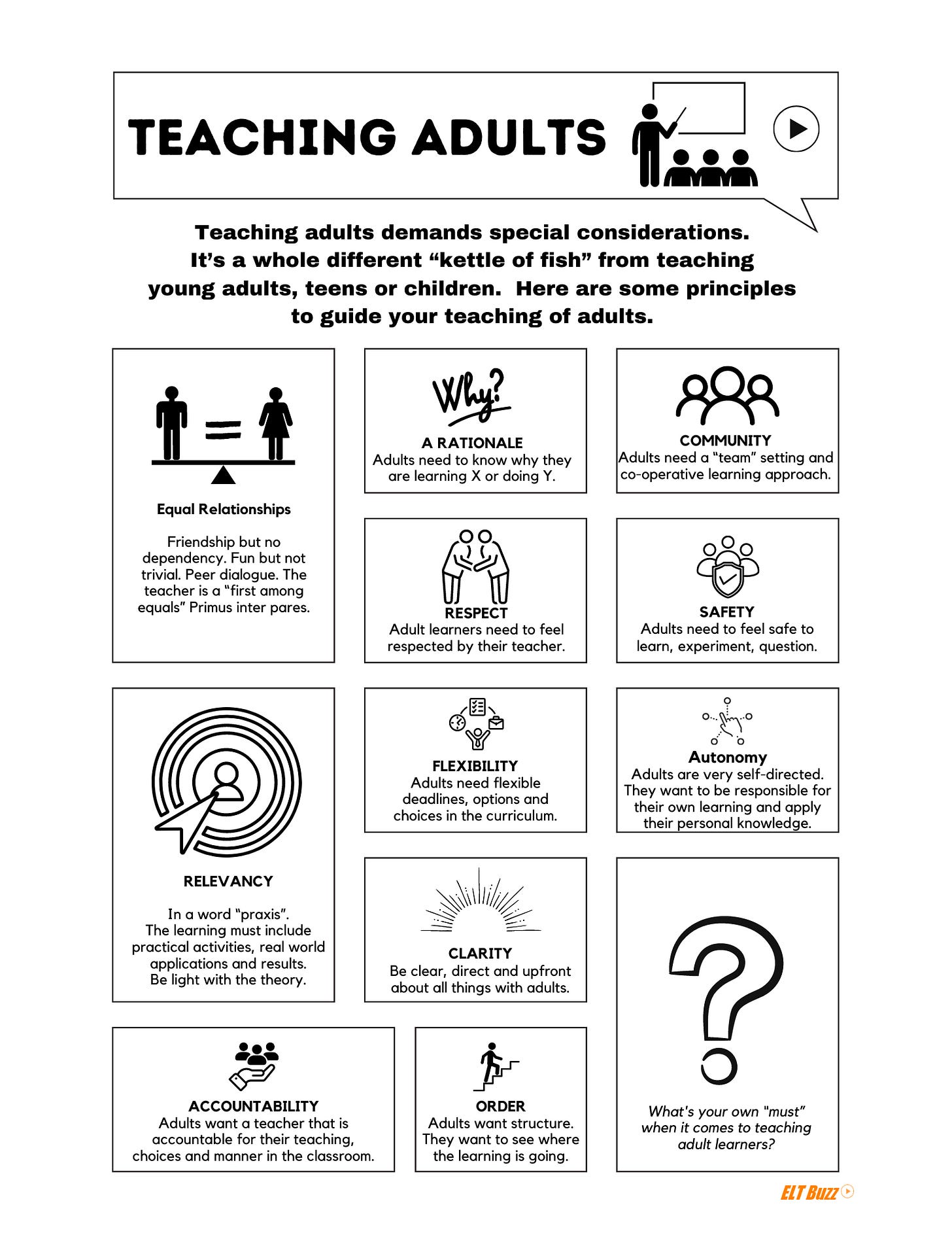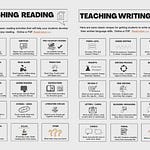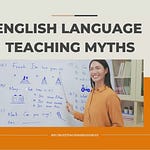ELT Pros On Linkedin | Video Library | Our Blog | ELT Buzz News | TpTs
I’ve taught adults both through my years of teacher training and also as an English teacher, teaching both Newcomers to Canada and adult business English classes. Although not originally trained in “Adult Ed.”, I slowly familiarized myself with the differences between teaching young learners, teaching teens and this challenging group - adults.
In many ways, it’s completely different, teaching adults. They are your peers. Bread winners just like you. They have demands on their time, families to look after and many responsibilities - just like you. The first time teaching adults, many teachers are kind of overwhelmed, in shock. Even overcome with imposter syndrome - “Who am I to tell “adults” what is and isn’t?” is often floating through the subconscious mind of an adult Ed. teacher.
In my own work, I’ve noticed several key features of adult learners that a teacher should understand and embed when teaching adults. Also, I’ve greatly appreciated reading and the work of Jane Vella and see her 12 Principles of Effective Adult Learning below.
In short, I see the task of teaching adult learners revolving around the following three fundamental criteria; Relevancy, Reciprocity and Regulation.
Relevancy
Adult learners want what they learn to be immediately relevant to their own lives and the world they live in. They honor practicality, immediacy and so demand that the curriculum be tied into real world skills and applications. In a word, “praxis”.
I believe it is important that teachers allow as much as possible, for adult learners to contribute and use their own experiences, knowledge in the learning process. It brings the curriculum “into” them and makes it more relevant. Seek as a teacher to connect the lives (knowledge, beliefs, culture) of your adult learners with the curriculum.
Reciprocity
Adult learners need your respect, more than any other type of learner. You’ll lose them immediately if they don’t feel respected, worthy in your eyes. It’s a deal breaker.
Your relationship with adults should be one of equals, think “primus inter pares” - you the teacher are “first among equals” but just by a thread. Don’t destroy that two way street of respect. Adult learners want a teacher that is accountable on all levels; from their lesson delivery through to assessment. But on the other hand, adults want teachers to respect their own responsibility for learning, their own autonomy as individual learners.
Download the infographic as a PDF »>
Regulation
Adults are very practical minded when it comes to learning. They want “down to earth” structure. First A, then B, then C. They thrive and demand order in the learning process. Adults also want to control their own learning, and be more accountable for their own learning and regulation of that learning. Adults need flexible time schedules, due dates and curriculum with choices (so they can apply their own background, knowledge, skills). Adults want a say in how the classroom is controlled and who does what … teachers will have to make them part of any decision making processes - it is part of the “respect” contract mentioned in point 2.
So there are my own 3 categories. What’s essential for you when teaching adults? What key things make teaching adults different than other ages of learners?
Here as mentioned earlier, are Jane Vella’s 12 principles for effective teaching of adults. Download this as a pdf »>
12 Principles of Effective Adult Learning
1. Needs Assessment: “Doing an adequate needs assessment is both standard practice and a basic principle of adult learning, which honors the fact that while people may register for the same program they all come with different experience and expectations. How can we discover what the group really needs to learn, what they already know, what aspects of the course we have designed really fit their situations? Listening to learners’ wants and needs help shape a program that has immediate usefulness to adults.”
2. Safety: “People need both challenge and safety. When the learning environment does not appear safe to adult learners, they will disappear or resist the program dramatically to protect themselves.”
3. Sound Relationships: “…Relationship between the instructor and the learner is clearly an important factor in the learning process. I call this principle sound relationship-which implies there is friendship but no dependency, fun without trivializing learning, dialogue between [adults] who feel themselves peers.”
4. Sequence/Reinforcement: “Sequence is a vital principle in designing educational events….Nothing is more confusing to the adult learner than a design that is out of sequence! We suggest working from: simple to more complex, easy to more difficult, slowly to more quickly, A to B!”, “Reinforcement is another basic and vital principle for adult learning. The learner needs not only time for mastering new knowledge, skills and attitudes, but she or he also needs to have the mastery reinforced at every possible opportunity.”
5. Praxis: “Praxis means action with reflection. It combines inductive and deductive approaches to learning…When every learning task is a praxis, you will have immediacy and relevance and highly motivated learning.”
6. Respect for Learners: “Malcolm Knowles research shows that respect is the prime factor in adult learning. If learners do not feel respected by the teacher, they will not learn what they might learn.”
7. Ideas/Feeling/Action: “When learning, human beings can use three faculties: the mind, to consider ideas or cognitive material; the heart, the affective faculty, or feelings; and the muscle, in psychomotor activities (actions). [The learning-centered approach] stresses that the most effective learning uses all three aspects of learning as much as possible.”
8. Immediacy: “Without immediacy there is a dullness in the learning situation. The participants are there, but not there…All the decisions about content, methods, learning tasks, and materials are directed by this principle of immediacy. If a skill or attitude is not immediately useful to an adult, it is probably not being learned as effectively as possible.”
9. Clear Roles & Role Development: A teacher can be intent upon a dialogue with an adult learner, but if the learner sees the teacher as “the professor” with whom there is no possibility of disagreement, no questioning, no challenge, the dialogue is dead in the water. Adult learners need reinforcement of the human equality between teacher and student and among students. It takes time for adults to see themselves and the teacher in a new role.”
10. Teamwork: “Teams provide, in the adult learning experience, a quality of safety that is effective and helpful. The assurance of safety and shared responsibility available in terms has always proved welcome, no matter what the cultural setting. Teamwork cannot be taken for granted.”
11. Engagement: “Without engagement, there is no learning! The engagement of learners is not only an indication that they are learning, it is how they learn.”
12. Accountability: “Who is accountable to whom? First, adult learners are clearly accountable to themselves. No teacher can learn for a learner. Educators of adults must do all they can to be accountable to learners by carefully selecting people for courses, conducting LNRAs (Learning Needs & Resources Assessment), preparing achievement-based objectives, and designing feasible learning programs.”
Resources:
Vella, J. (2002). Learning to listen, learning to teach: The power of dialogue in educating adults. San Francisco, CA: Jossey-Bass













